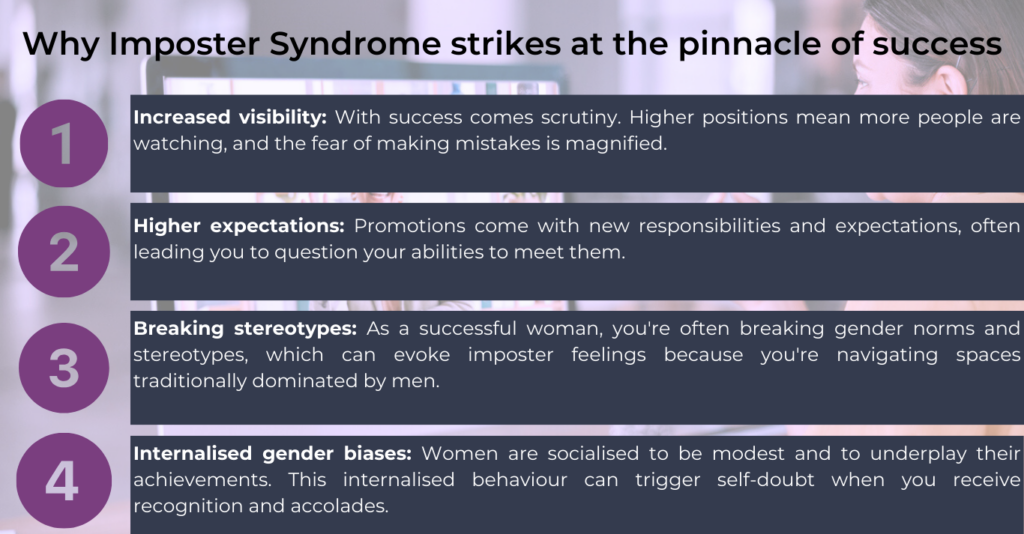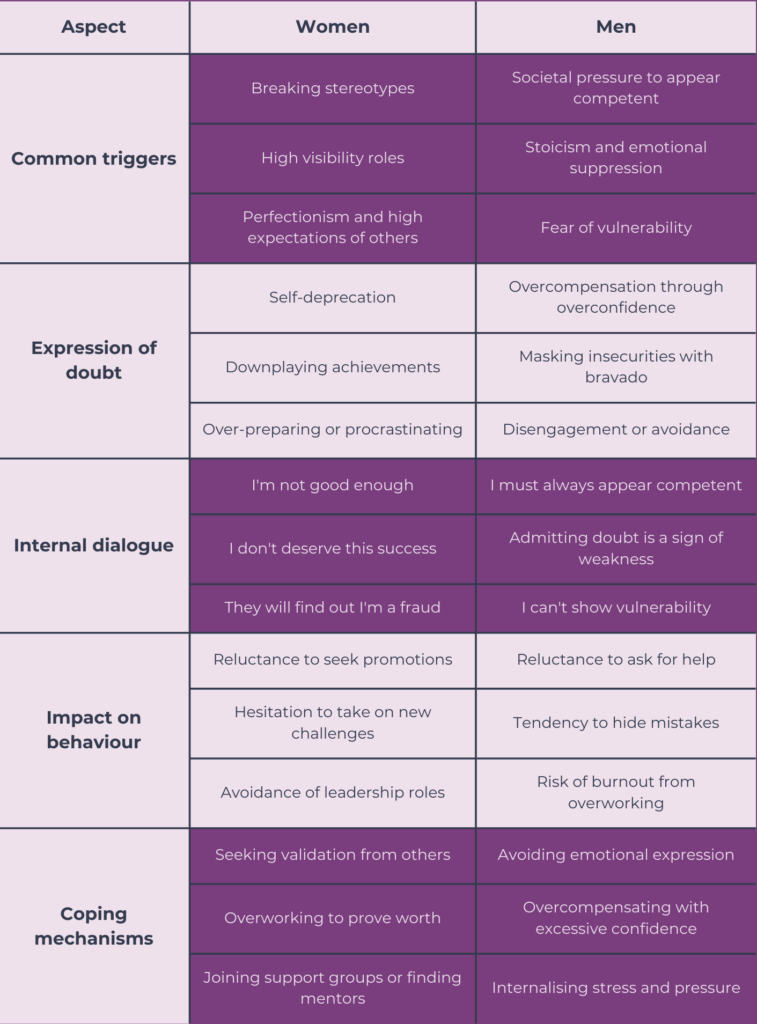Imagine this: You’ve just received a long-awaited promotion at work. You’ve climbed up the organisational hierarchy with determination and grit, breaking through boundaries and surpassing expectations. Your colleagues are congratulating you, your friends and family are proud, and your LinkedIn is flooded with well-wishers. Yet, amidst all this celebration, a gnawing doubt creeps in. ‘Do I really deserve this? Am I good enough? What if they find out I’m not as competent as they think?’ While Imposter Syndrome can strike any time, the paradox is that it often strikes hardest when you’re at your most successful.
Imposter Syndrome, or more accurately, Imposter Phenomenon, is the pervasive feeling of self-doubt and inadequacy despite evident success. This term, coined by psychologists in the late 1970s, was initially observed in high-achieving women. It reflects the systemic biases and social pressures that contribute to this debilitating experience, affecting your self-perception and professional trajectory.
When success strikes: The paradox of ‘natural talent’
Success can strike in various forms, and one of the most disorienting is when a project you’ve led or significantly contributed to gains unexpected visibility. Perhaps you possess a natural talent or skill in a particular area—be it strategic planning, creative design, or innovative problem-solving. When the project garners praise and acclaim, you might struggle with the recognition, feeling that it’s unwarranted. After all, if the skill comes so naturally to you, it can be easy to dismiss the hard work and dedication you’ve poured into honing it.
This paradox of natural talent can make it challenging to accept praise, as you may feel that if something comes easily, it must not be valuable or deserving of accolades. This is a common yet misleading mindset that fuels Imposter Syndrome, making you question your worthiness of the success you’ve achieved.
If you find yourself experiencing Imposter Syndrome in this situation, consider asking yourself the following questions:
- Could someone else have done this any better?
Reflect on the unique value you bring to the table. Your skills and contributions are distinctive and it’s unlikely that anyone else could replicate your success in the same way with the same results. - What specific skills and efforts did I invest in this project?
Break down the components of your work and recognise the specific talents, efforts, and expertise you applied. This can help you see that even natural abilities require cultivation and effort. - How has my work positively impacted others or the project outcome?
Consider the broader impact of your work. Acknowledge how your contributions have benefitted your team, project, or organisation. This external validation can help you appreciate the significance of your achievements.
Reframing Imposter Syndrome: It's not you; it's the system
As women, we are all too often conditioned to believe that our achievements are less deserved than those of our male counterparts. This is where reframing Imposter Syndrome as Imposter Phenomenon becomes crucial. Understanding that your feelings stem not from a personal failing but are the result of systemic inequalities can be liberating. The workplace often undermines women’s accomplishments through subtle biases and higher expectations, making us feel like frauds—even, or perhaps particularly, when we’re thriving.
When you hit a significant milestone—like a promotion—you’re stepping into new, uncharted territory. Success brings visibility, and with it, the fear of exposure. The societal narrative often suggests that women are naturally less capable in leadership roles, perpetuating the Imposter Phenomenon. By acknowledging that these doubts are rooted in external biases rather than internal inadequacies, you can begin to reclaim your sense of self-worth.

Regain control with actionable strategies
- Acknowledge your achievements: Keep a success journal. Document your accomplishments, big and small, to remind yourself of your journey and the hard work you’ve put in. Download our journal prompts handout that’s designed specifically to help you work through your feelings and get back on track.
- Seek support: Surround yourself with a network of supportive peers and mentors who can provide perspective, encouragement, and objective feedback about why you’ve been successful.
- Challenge negative self-talk: When self-doubt creeps in, counter it with evidence of your competence. Replace ‘I don’t know what I’m doing’ with ‘I’ve prepared for this role and have the skills to succeed’.
- Embrace your vulnerability: Accept that it’s okay not to know everything. Asking questions and seeking help doesn’t diminish your achievements; it enhances your learning and potential for continued growth.
- Seek our professional Development: Continuously invest in your skills and knowledge. Confidence often comes from knowing that you’re well-prepared and capable. Furthermore, an everywoman study shows that when women receive training opportunities, it doesn’t just enhance their potential, but also their wellbeing.
- Consider others’ perspectives: Put yourself in the shoes of the person who’s giving you that promotion or advocating for your work. Do you value and respect their opinion in other areas? If so, why not accept their judgment in this regard? Trust in their discernment and recognise that their positive assessment of your abilities is well-founded.
Not just a female issue
While Imposter Syndrome is often discussed in the context of women and their experiences as they navigate the pipeline, men experience it too, albeit differently. Societal expectations for men to be stoic and confident can make it harder for them to express vulnerability and self-doubt. Men might mask their imposter feelings with overconfidence or disengagement, fearing that admitting uncertainty could be seen as weakness.
Including men in the conversation about Imposter Syndrome is vital. When both genders recognise that these feelings are a shared experience, it fosters a more supportive and empathetic work environment. Encouraging men to speak openly about their struggles can help dismantle toxic masculinity and promote a culture where vulnerability is valued rather than stigmatised.
Examples of gender differences in experiencing Imposter Syndrome…

What next?
Journaling can be a useful way to work through imposter feelings and find a healthier relationship with your own success. We’ve created a downloadable handout with journaling prompts you can use to get you started.






